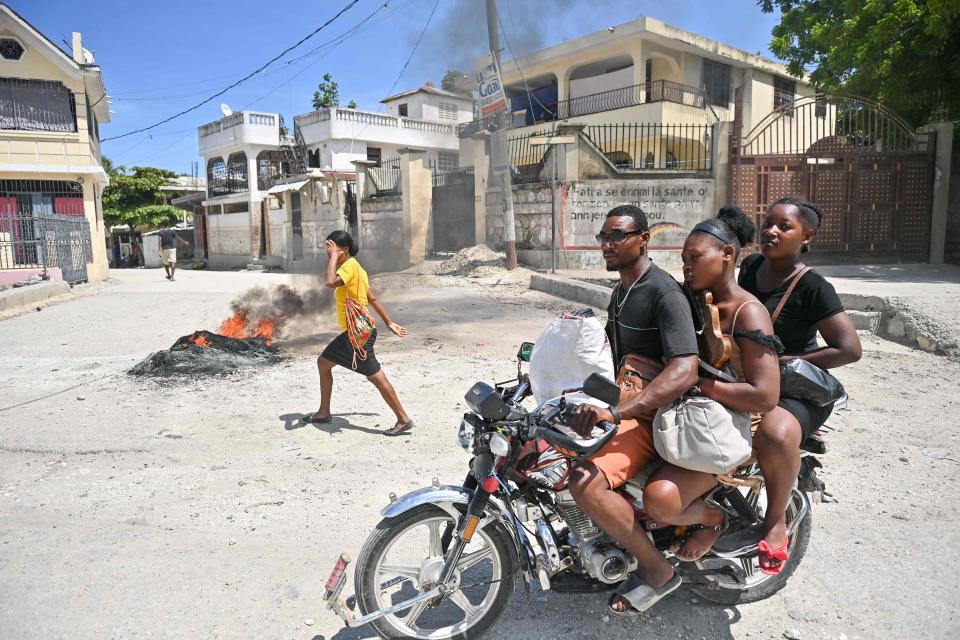'Glimmer of hope' as U.N. approves foreign force to combat Haiti's gangs
The United Nations Security Council on Monday authorized the use of a Kenya-led multinational security force to help Haiti combat gang violence that has terrorized the population, led to a spike in killings, kidnappings and rapes, and brought the nation's political and economic activity to a standstill.
The authorization for the mission by the 15-member Council came about a year after Haiti's Prime Minister Ariel Henry appealed for international assistance to restore order in the Western Hemisphere's poorest nation.
The mission, when it deploys, will represent the most significant force for Haiti since a U.N. peacekeeping mission disbanded in 2017. Poverty, violence and corruption in Haiti have long spurred migration to the U.S.
The country has been in free fall since the 2021 still-unsolved assassination of President Jovenel Moïse. Armed gangs have taken over large parts of the country, unleashing brutal violence and overwhelming's Haiti's already weak political and economic institutions, as well as its small and poorly equipped police forces and military.
Haiti spinning out of control: on every metric from gangs to kidnappings, migration to murder
Kenya has pledged to send at least 1,000 security personnel to help train and assist Haitian police and several of the Caribbean country's neighbors such as Antigua and Barbuda, the Bahamas and Jamaica have also offered support to the mission. The deployed force aims to secure critical infrastructure and transportation hubs in Haiti such as airports, ports, schools, hospitals and key roads, according to the U.N.
After the vote, Jean Victor Généus, Haiti’s foreign minister, described the passing of the U.N. resolution for the force as "an expression of solidarity with a population in distress." He said it was a "glimmer of hope for a people that have for too long been suffering." However, it was not immediately clear when the mission will be deployed, its precise size, or what rules of engagement international security personnel will be expected to follow.

Why does Haiti need an international force?
A recent U.N. assessment concluded that the gangs now control or exercise influence over 80% of Haiti's capital Port-au-Prince and their violent activities appear to be expanding to other cities and regions as law and order continues to break down. From October last year to June, nearly 3,000 people have died in what the U.N. describes as "intentional killings." Nearly 1,500 kidnappings for ransoms were reported.
'Immense joy': American nurse and daughter released after being kidnapped in Haiti
What role does the U.S. have in the Haiti force?
The U.N. resolution was drafted by the U.S. and Ecuador and U.S. Secretary of State Antony Blinken said Washington stands ready to provide financial and logistical support to the Haiti mission. But the Biden administration has made it clear it does not want to lead the force or send U.S. troops.
Top U.S. diplomat: Haiti needs foreign troops to help with a gang-related crisis
Daniel Foote, a former U.S. special envoy to Haiti, previously told USA TODAY that this reluctance likely stems partly from the amount of resources and time required, and partly from the U.S.'s track record of messy interventions in Haiti that have failed to lead to better conditions on the ground.
Kenya did not need U.N. approval to lead the mission but said it wouldn't do it without it. Of the Council's 15 members, only Russia and China abstained from the vote, though they did not block it.
The U.N. is also distancing itself from the mission, noting that the force is not a U.N. peacekeeping mission per see but a U.N.-authorized force − a forced backed by international law − overseen by Kenya. The U.N.'s reputation in Haiti has been tarnished by a previous peacekeeping mission when its staff were blamed for bringing a cholera outbreak to the country that killed nearly 10,000 people and sexually assaulting locals.
A force for Haiti: What happens now?
The Kenya-led force has been given a 12-month mandate. But the timing of its deployment has not been finalized. The resolution also calls for most weapons sales to Haiti to be halted.
Some aid groups expressed tentative optimism to the development.
Jed Meline, director of policy and advocacy for humanitarian organization Project HOPE, said it was a "positive step." However, he said its success depends on active Haitian participation.
"It’s essential to recognize that intervention alone won’t bring stability to Haiti," he said. "The international community, in collaboration with local Haitian organizations, must chart new paths for aid."
Still, Jean-Junior Joseph, an adviser to Haiti's leader Henry, said in a WhatsApp message to USA TODAY on Tuesday morning that his government welcomed the U.N. authorization.
"We thank all those who voted," he said. "We look forward to seeing the mission to combat general insecurity."
This article originally appeared on USA TODAY: U.N. authorizes Kenya-led force to combat Haiti's gangs
